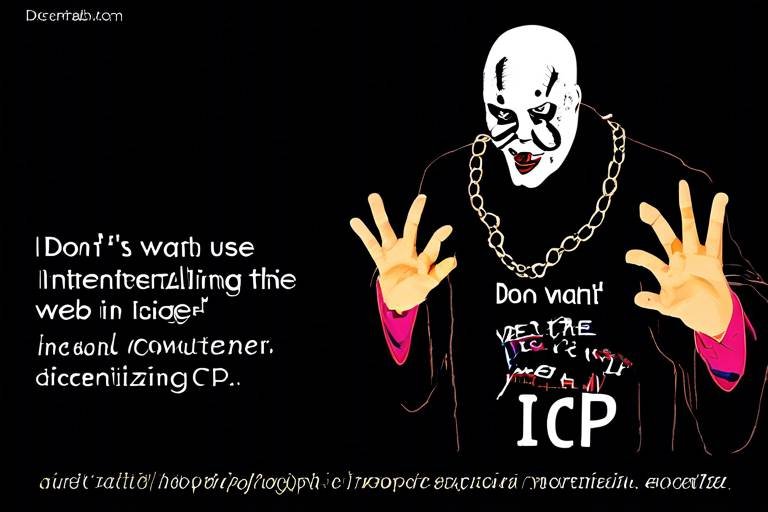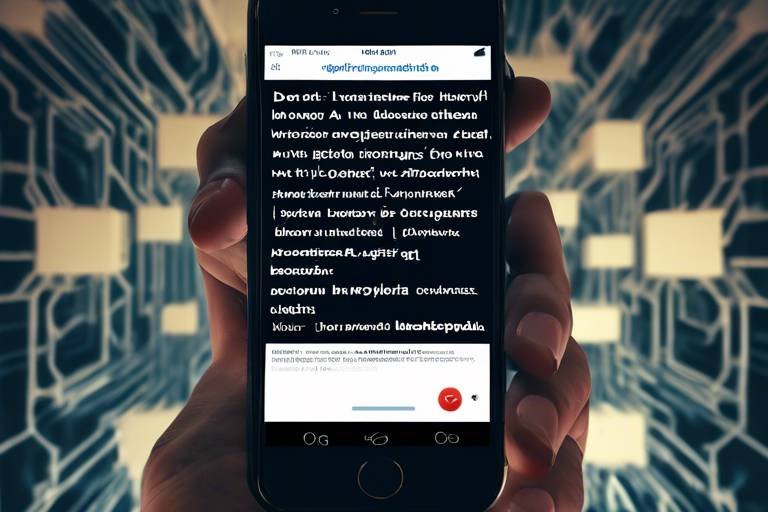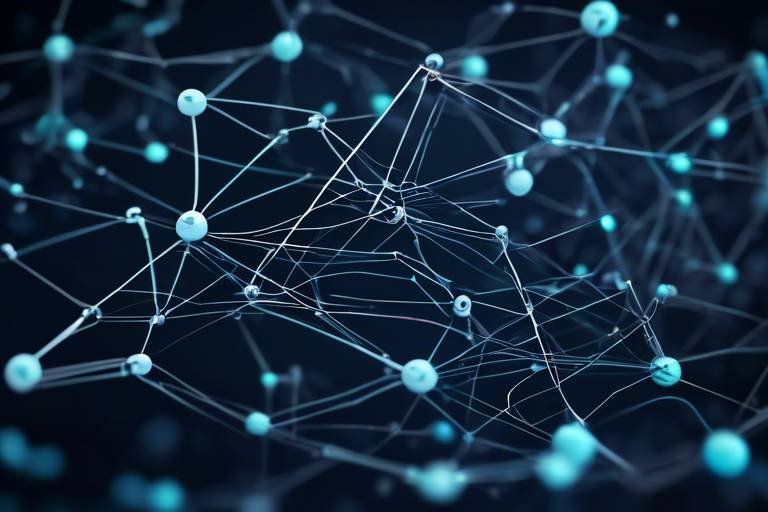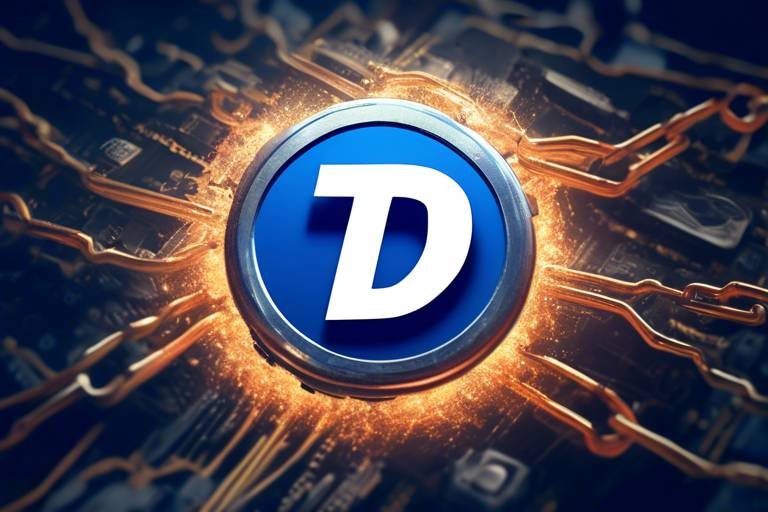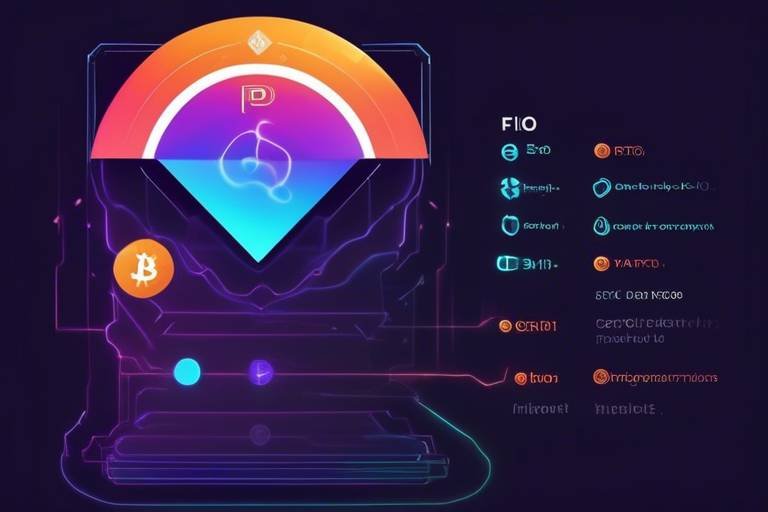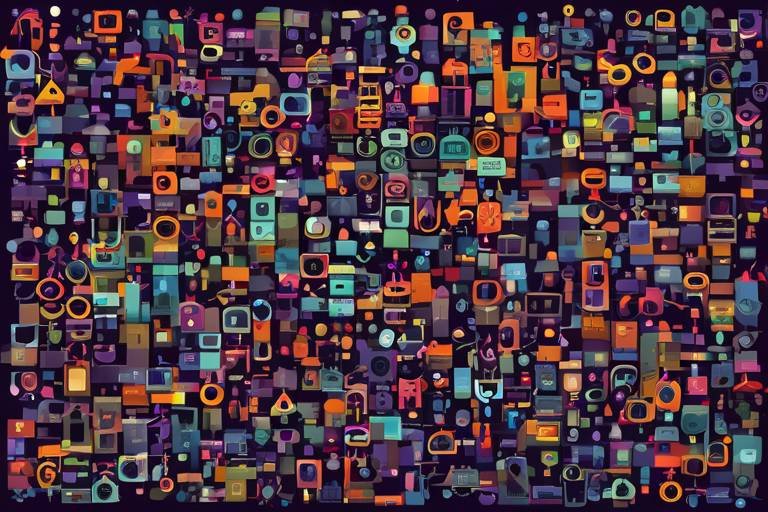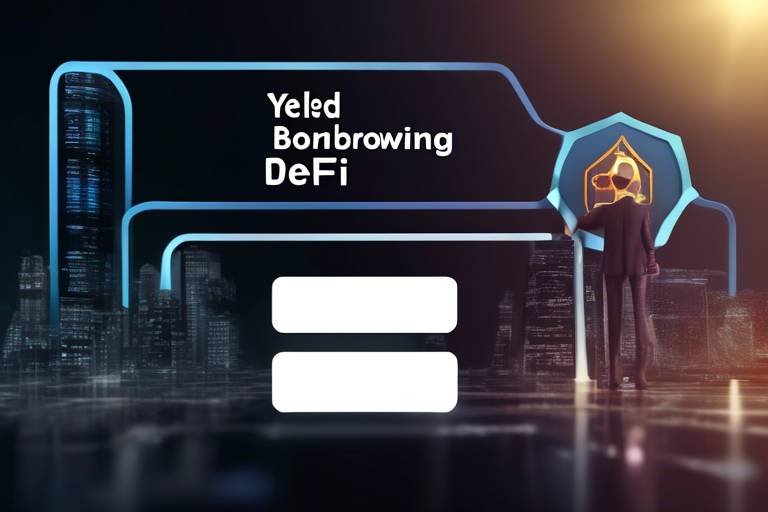Internet Computer (ICP) - Decentralizing the Web
In today's digital age, the concept of decentralization is gaining momentum, and Internet Computer (ICP) is at the forefront of this revolution. Imagine a world where applications run on a decentralized network, free from the constraints of traditional server infrastructures. This is not just a dream; it's a reality that ICP is making possible. By leveraging blockchain technology, ICP aims to transform the internet into a more open and accessible platform for everyone. Whether you're a developer looking to create the next big app or a user seeking more control over your data, ICP offers a promising solution that challenges the status quo.
At its core, ICP is designed to extend the functionality of the internet, allowing developers to build and deploy applications that are not only scalable but also resilient. This means that applications can run seamlessly without the need for centralized servers, enabling a truly decentralized ecosystem. With ICP, the power is shifting back to the users and developers, fostering innovation and creativity in ways we have yet to fully explore. So, what does this all mean for the future of the web? Let's dive deeper into the key features, benefits, and challenges that come with this groundbreaking technology.
Internet Computer (ICP) is a blockchain-based platform designed to extend the functionality of the internet, enabling developers to build and deploy applications without traditional server infrastructure, thereby enhancing decentralization and scalability.
ICP boasts several unique features, including smart contract capabilities, high scalability, and a novel governance model, which collectively contribute to its potential as a transformative force in the digital landscape.
Smart contracts on the Internet Computer allow developers to create complex applications that run autonomously, increasing efficiency and reducing reliance on intermediaries, thus fostering a truly decentralized ecosystem.
The implementation of smart contracts on ICP offers numerous advantages, including enhanced security, transparency, and the ability to automate processes, which can significantly lower operational costs for businesses.
Despite their benefits, smart contracts face challenges such as security vulnerabilities and the need for thorough auditing, which are crucial to prevent potential exploits and ensure trust in decentralized applications.
ICP's governance model empowers stakeholders to participate in decision-making processes, ensuring that the platform evolves according to community needs while maintaining decentralization and preventing central authority dominance.
The Internet Computer supports a variety of use cases, from decentralized finance (DeFi) applications to social networks, showcasing its versatility and potential to disrupt traditional online services across multiple sectors.
ICP enables the creation of DeFi applications that operate without intermediaries, allowing users to engage in financial transactions securely and transparently, thus democratizing access to financial services.
The platform facilitates the development of dApps that can run directly on the internet, providing users with seamless access to services without the need for centralized servers, enhancing user privacy and control.
What is the Internet Computer?
The Internet Computer is a blockchain-based platform that allows developers to build and deploy applications directly on the internet, removing the need for traditional server infrastructure.
How does ICP ensure decentralization?
ICP achieves decentralization through its unique governance model, allowing stakeholders to participate in decision-making processes and ensuring that no single entity can dominate the platform.
What are the benefits of using smart contracts on ICP?
Smart contracts on ICP provide enhanced security, transparency, and the ability to automate processes, which can significantly reduce operational costs for businesses.
What challenges do smart contracts face?
Smart contracts can be vulnerable to security issues and require thorough auditing to prevent potential exploits and maintain trust in decentralized applications.
What are some use cases for ICP?
ICP supports various use cases, including decentralized finance (DeFi) applications and decentralized applications (dApps), showcasing its versatility in disrupting traditional online services.

What is Internet Computer (ICP)?
The Internet Computer (ICP) is a groundbreaking blockchain-based platform that aims to revolutionize the way we perceive and use the internet. Imagine a world where developers can create and deploy applications without relying on traditional server infrastructures. This is the essence of ICP—it extends the functionality of the internet, allowing for a more decentralized and scalable web. By eliminating the need for centralized servers, ICP empowers developers to build applications that are not only efficient but also resilient against censorship and downtime.
At its core, the Internet Computer operates on a network of independent data centers, which collaborate to host applications in a decentralized manner. This means that instead of a single entity controlling the data and services, the power is distributed among multiple stakeholders. This decentralization is crucial for enhancing security and transparency, which are often compromised in traditional internet models.
Furthermore, ICP utilizes a unique consensus mechanism known as Chain Key Technology, which enables the network to process transactions at lightning speed. This capability not only enhances user experience but also supports the development of complex applications that can handle a large volume of users simultaneously. The potential of ICP goes beyond just hosting applications; it aims to create a new digital economy where individuals and businesses can interact without the need for intermediaries.
In summary, the Internet Computer (ICP) is not just another blockchain project; it's a visionary platform that seeks to redefine the internet as we know it. By leveraging the power of decentralization, ICP opens the door to a plethora of opportunities for developers and users alike, paving the way for a more inclusive and innovative digital landscape.

Key Features of ICP
The Internet Computer Protocol (ICP) is not just another blockchain; it’s a revolutionary platform that aims to transform the internet as we know it. At its core, ICP is designed to extend the functionality of the web, enabling developers to build and deploy applications seamlessly without relying on traditional server infrastructures. This is a game-changer, folks! Imagine a world where applications run directly on the internet, free from the constraints of centralized servers. Sounds exciting, right?
One of the standout features of ICP is its smart contract capabilities. These aren't your average contracts; they are autonomous programs that execute automatically when certain conditions are met. This means developers can create complex applications that operate independently, cutting out the middleman and increasing efficiency. Think of it as having a digital butler that takes care of your chores without needing constant supervision!
Moreover, ICP boasts remarkable scalability. Unlike many traditional blockchains that struggle with congestion, ICP can handle a massive number of transactions simultaneously. This is akin to having a superhighway for data instead of a narrow country road. This scalability ensures that applications can grow and adapt without performance hiccups, making it ideal for high-demand environments.
Another crucial aspect of ICP is its novel governance model. Unlike centralized platforms that are often controlled by a handful of stakeholders, ICP empowers its community. Stakeholders can participate in decision-making processes, ensuring that the platform evolves in a way that reflects the needs of its users. This is a significant step toward true decentralization, as it prevents any single entity from wielding excessive power over the ecosystem.
To summarize, the key features of ICP can be encapsulated as follows:
- Smart Contracts: Autonomous and efficient applications.
- High Scalability: Handles a vast number of transactions without lag.
- Decentralized Governance: Community-driven decision-making processes.
These features collectively position ICP as a transformative force in the digital landscape, paving the way for a more decentralized and user-centric internet. As we continue to explore the potential of the Internet Computer, it’s clear that it holds the promise of redefining how we interact with technology and each other online.

Smart Contracts on ICP
The concept of smart contracts on the Internet Computer (ICP) is revolutionizing the way we think about applications and transactions on the web. Imagine a world where agreements are not just written on paper but are coded into a digital format that executes automatically when certain conditions are met. This is the essence of smart contracts on ICP. They allow developers to create applications that run autonomously, meaning they can operate without the need for human intervention once they are deployed. This innovation not only increases efficiency but also significantly reduces the reliance on intermediaries, such as banks or legal entities, thus fostering a truly decentralized ecosystem.
One of the most exciting aspects of smart contracts on ICP is their ability to facilitate complex interactions seamlessly. Developers can code intricate workflows that can handle everything from simple transactions to multi-step processes, all while ensuring that the rules of the contract are adhered to without any outside influence. For instance, in a traditional financial transaction, you might need a bank to verify and process the transaction. However, with smart contracts, the verification is built into the code itself, allowing for instantaneous and secure transactions. This paradigm shift not only enhances the user experience but also opens up a myriad of possibilities for innovation.
Furthermore, smart contracts on ICP are designed to be secure and transparent. Each transaction is recorded on the blockchain, providing a permanent and immutable record that can be audited by anyone. This level of transparency is crucial in building trust among users and stakeholders. Additionally, the security features inherent in blockchain technology help protect against fraud and unauthorized access, making smart contracts a reliable choice for various applications.
However, it's important to note that while smart contracts offer numerous advantages, they are not without their challenges. For instance, security vulnerabilities can arise if the code is not thoroughly audited before deployment. Just like a house with weak foundations can crumble, poorly written smart contracts can be exploited by malicious actors. Therefore, rigorous testing and auditing processes are essential to ensure that these contracts function as intended and maintain the trust of users.
In summary, smart contracts on the Internet Computer represent a significant advancement in the way applications are built and operated. They empower developers to create decentralized applications that are efficient, secure, and transparent. As the technology matures, we can expect to see an increasing number of innovative solutions that leverage the power of smart contracts, ultimately reshaping our digital landscape.
- What are smart contracts?
Smart contracts are self-executing contracts with the terms of the agreement directly written into code, allowing for automated execution without intermediaries. - How do smart contracts enhance security?
Smart contracts are built on blockchain technology, which provides a secure and immutable record of transactions, reducing the risk of fraud. - What challenges do smart contracts face?
Challenges include potential security vulnerabilities and the need for thorough auditing to ensure their reliability and trustworthiness. - Can smart contracts be used for any application?
Yes, smart contracts can be utilized in various sectors, including finance, supply chain, and healthcare, to automate processes and enhance efficiency.

Benefits of Smart Contracts
Smart contracts on the Internet Computer (ICP) are revolutionizing the way we think about digital agreements and transactions. Imagine a world where contracts are executed automatically, without the need for intermediaries. That's exactly what smart contracts offer. They are not just lines of code; they represent a shift towards a more efficient and transparent system. Here are some of the key benefits:
- Enhanced Security: Smart contracts are built on blockchain technology, which means they are inherently secure. The decentralized nature of the blockchain makes it nearly impossible for any single entity to alter the contract without consensus. This significantly reduces the risk of fraud and manipulation.
- Transparency: Every transaction executed through a smart contract is recorded on the blockchain, making it visible to all stakeholders. This transparency fosters trust among parties, as everyone can verify the terms and execution of the contract.
- Cost Efficiency: By eliminating intermediaries, smart contracts can dramatically lower operational costs. Businesses no longer need to pay for services like legal advice or transaction fees associated with traditional contracts.
- Automation: Smart contracts automatically execute actions when predefined conditions are met. This automation not only speeds up processes but also minimizes human error. For instance, in a supply chain scenario, payment can be automatically released to a supplier once goods are delivered and verified.
- Accessibility: With the Internet Computer, anyone with an internet connection can create and interact with smart contracts. This democratizes access to services and opportunities that were previously reserved for those with significant resources.
In essence, the adoption of smart contracts on ICP is not just about technology; it's about creating a more equitable and efficient digital landscape. As businesses and developers harness these benefits, we can expect to see an explosion of innovative applications that redefine how we engage with the digital world.
What are smart contracts?
Smart contracts are self-executing contracts with the terms of the agreement directly written into code. They automate processes and eliminate the need for intermediaries.
How do smart contracts enhance security?
Smart contracts are secured by blockchain technology, which makes them tamper-proof and resistant to fraud. Once deployed, they cannot be altered without consensus from the network.
Can smart contracts be audited?
Yes, smart contracts can and should be audited to identify vulnerabilities before they are deployed. This is crucial for maintaining trust in decentralized applications.
What industries can benefit from smart contracts?
Smart contracts can benefit a wide range of industries, including finance, real estate, supply chain management, and healthcare, by automating processes and enhancing transparency.

Challenges of Smart Contracts
While smart contracts on the Internet Computer (ICP) present a fascinating frontier in the realm of decentralized applications, they are not without their challenges. One of the primary concerns is security. Smart contracts, once deployed, are immutable, meaning that any bugs or vulnerabilities within the code can be exploited by malicious actors. Imagine writing a huge paper with a critical error; once it's submitted, you can't change it! This immutability can be a double-edged sword, as it ensures trust but also requires rigorous testing before deployment.
Another significant challenge is the need for thorough auditing. The complexity of smart contracts often leads to oversight in coding, which can result in unintended consequences. For instance, a minor mistake in the code could lead to significant financial losses. Therefore, developers must invest time and resources into auditing their contracts, which can be both costly and time-consuming. The reality is, without proper audits, the risk of exploits increases exponentially, making it essential for developers to prioritize this step.
Furthermore, the legal landscape surrounding smart contracts is still evolving. Many jurisdictions lack clear regulations regarding the use of blockchain technology and smart contracts, which can create uncertainty for businesses looking to adopt these solutions. Without a solid legal framework, companies may hesitate to fully embrace smart contracts, fearing potential legal repercussions.
Additionally, interoperability poses a challenge. Smart contracts on ICP must be able to interact with other blockchains and existing systems. If they can't communicate effectively, the potential for fragmented applications increases, which could hinder the overall adoption of decentralized technologies. Developers face the daunting task of ensuring that their smart contracts can work seamlessly across various platforms.
Lastly, scalability is a concern that cannot be overlooked. As more users and applications utilize smart contracts, the demand for processing power and network resources grows. If the underlying infrastructure cannot handle this increased load, it could lead to slower transaction times and higher costs. This is particularly critical for applications that require real-time processing, such as financial transactions.
In summary, while the potential of smart contracts on the Internet Computer is immense, these challenges must be addressed to ensure their successful implementation. Developers, stakeholders, and the broader community need to collaborate to create solutions that mitigate these risks, paving the way for a more secure and efficient decentralized future.
- What are smart contracts? Smart contracts are self-executing contracts with the terms of the agreement directly written into code, running on a blockchain.
- Why are audits important for smart contracts? Audits help identify and fix vulnerabilities in the code before deployment, reducing the risk of exploits.
- How does the legal landscape affect smart contracts? The lack of clear regulations can create uncertainty, making businesses hesitant to adopt smart contracts.
- What is interoperability in the context of smart contracts? Interoperability refers to the ability of smart contracts to interact with other blockchains and systems, which is crucial for their functionality.
- Why is scalability a concern for smart contracts? As usage increases, the demand for processing power and network resources can lead to slower transactions and higher costs if not managed properly.

Governance Model of ICP
The governance model of the Internet Computer (ICP) is a fascinating aspect that sets it apart from traditional blockchain platforms. Unlike conventional systems that often rely on a small group of developers or stakeholders to make critical decisions, ICP embraces a more democratic approach. This model empowers all token holders to participate in the decision-making processes, ensuring that the platform evolves in a manner that reflects the community's needs and desires.
At the heart of this governance structure is the concept of Network Nervous System (NNS). The NNS is an autonomous software that governs the Internet Computer, making it a self-managing system. It allows users to submit proposals for changes or improvements, which are then voted on by ICP token holders. This way, every participant has a say in the future of the network, fostering a sense of ownership and responsibility among users.
Moreover, the governance model incorporates a unique mechanism to prevent central authority dominance. By distributing power across a wide array of stakeholders, ICP mitigates the risks associated with centralization, which can often lead to corruption or mismanagement. This decentralized governance promotes transparency and accountability, making it more difficult for any single entity to manipulate the system for personal gain.
To further illustrate how this governance model operates, consider the following aspects:
- Proposal Submission: Any token holder can submit a proposal for changes or new features.
- Voting Process: Token holders can vote on proposals, with their voting power proportional to the amount of ICP tokens they hold.
- Implementation: Once a proposal receives enough votes, the NNS automatically implements the changes, ensuring a seamless transition.
This innovative governance model not only enhances the decentralization of the Internet Computer but also encourages active participation from its community. As more users engage in the governance process, the platform becomes increasingly robust and adaptable to the ever-changing digital landscape. This is crucial in a world where technology evolves at breakneck speed, and the ability to pivot and adapt is paramount for success.
In summary, the governance model of ICP exemplifies a shift towards a more inclusive and participatory approach in the blockchain space. By leveraging the power of community involvement, ICP not only enhances its decentralization but also sets a precedent for future platforms aiming to democratize their governance structures.
Here are some common questions regarding the governance model of the Internet Computer:
- How can I participate in the governance of ICP? You can participate by holding ICP tokens, which give you the right to vote on proposals submitted to the Network Nervous System.
- What types of proposals can be submitted? Proposals can range from technical upgrades to changes in economic policies or community initiatives.
- Is there a risk of centralization in ICP's governance? The design of the governance model aims to minimize centralization by distributing power among a wide array of stakeholders.

Use Cases for Internet Computer
The Internet Computer (ICP) is not just a technological marvel; it's a platform that opens up a world of possibilities. Imagine a vast landscape where applications are not confined to traditional servers but thrive in a decentralized ecosystem. This is the reality ICP offers, and its use cases are as diverse as they are impactful. From Decentralized Finance (DeFi) to Decentralized Applications (dApps), the Internet Computer is reshaping how we interact with the digital world.
One of the most exciting areas where ICP shines is in the realm of Decentralized Finance (DeFi). By utilizing ICP, developers can create financial applications that operate without the need for intermediaries, such as banks or payment processors. This not only enhances security but also democratizes access to financial services, allowing anyone with an internet connection to participate. Imagine being able to lend, borrow, or trade assets without the heavy fees and restrictions imposed by traditional financial institutions. With ICP, the future of finance is not just bright—it's accessible.
Moreover, the Internet Computer facilitates the development of Decentralized Applications (dApps). These applications run directly on the internet, eliminating the need for centralized servers. This means users can access services with greater privacy and control over their data. For instance, a social media platform built on ICP could allow users to own their content and data, providing a refreshing alternative to conventional platforms that monetize user information. This shift towards user sovereignty is not just a trend; it's a movement towards a more equitable digital landscape.
In addition to DeFi and dApps, the Internet Computer supports various other use cases. Here are some noteworthy examples:
- Gaming: Developers can create immersive gaming experiences that leverage blockchain technology for ownership of in-game assets.
- Supply Chain Management: Businesses can utilize ICP to enhance transparency and traceability in their supply chains, ensuring authenticity and reducing fraud.
- Content Distribution: Creators can distribute their work directly to consumers, bypassing traditional platforms that take a cut of their earnings.
Each of these use cases demonstrates how ICP is not just a platform but a catalyst for innovation. It empowers developers to think outside the box and create solutions that challenge the status quo. The potential for disruption is enormous, and as more people begin to understand and adopt this technology, the landscape of the internet will continue to evolve.
Q: What is the Internet Computer?
A: The Internet Computer is a blockchain-based platform that allows developers to build and deploy applications without traditional server infrastructure, enhancing decentralization and scalability.
Q: How do smart contracts work on ICP?
A: Smart contracts on ICP are self-executing contracts with the terms of the agreement directly written into code, allowing for automation and reducing reliance on intermediaries.
Q: What are the benefits of using ICP for decentralized applications?
A: Benefits include enhanced security, transparency, user control over data, and lower operational costs, making it an attractive option for developers and users alike.
Q: What challenges do smart contracts face?
A: Challenges include potential security vulnerabilities and the necessity for thorough auditing to ensure trust and reliability in decentralized applications.
Q: How does the governance model of ICP work?
A: ICP's governance model allows stakeholders to participate in decision-making processes, ensuring that the platform evolves according to community needs while maintaining decentralization.

Decentralized Finance (DeFi)
Decentralized Finance, or DeFi, is revolutionizing the way we think about financial services. At its core, DeFi leverages the power of blockchain technology, particularly the capabilities of platforms like the Internet Computer (ICP), to create an ecosystem where financial transactions can occur without the need for traditional intermediaries such as banks or brokers. This shift not only enhances accessibility but also fosters a sense of empowerment among users who are often marginalized by conventional financial systems.
Imagine a world where you can lend, borrow, trade, and earn interest on your assets without the cumbersome processes associated with traditional finance. DeFi applications built on ICP allow users to participate in financial activities in a more secure and transparent manner. For instance, users can engage in peer-to-peer lending, where they can lend their assets directly to others and earn interest, all while eliminating the need for a central authority to manage these transactions.
One of the most exciting aspects of DeFi is its democratizing effect. It opens up a world of financial opportunities to anyone with an internet connection, allowing individuals from various socio-economic backgrounds to access services that were previously out of reach. The potential for financial inclusion is immense, as DeFi platforms can cater to unbanked populations, providing them with tools to manage their finances effectively.
However, it's essential to recognize that while the benefits are significant, the DeFi space is not without its challenges. Users must navigate potential risks such as smart contract vulnerabilities and market volatility. It's crucial for participants to conduct thorough research and understand the platforms they engage with. The landscape is evolving rapidly, and staying informed is key to making sound financial decisions.
To illustrate the impact of DeFi, consider the following table showcasing some popular DeFi applications and their functionalities:
| Application | Description | Key Features |
|---|---|---|
| Compound | A decentralized lending platform. | Interest earning, lending, and borrowing. |
| Uniswap | A decentralized exchange for trading tokens. | Liquidity pools, automated market-making. |
| Aave | A lending protocol that allows users to earn interest. | Flash loans, variable and stable interest rates. |
As we navigate through this exciting era of DeFi, it’s essential to keep an eye on how platforms like ICP are paving the way for a more inclusive financial future. By removing barriers and enhancing accessibility, DeFi is not just a trend; it's a movement towards a more equitable financial landscape.
- What is DeFi? DeFi stands for Decentralized Finance, which refers to financial services that operate on blockchain technology without traditional intermediaries.
- How does DeFi work? DeFi uses smart contracts on blockchain platforms to facilitate transactions, lending, and trading directly between users.
- What are the benefits of DeFi? The benefits include increased accessibility, lower costs, enhanced security, and the potential for financial inclusion.
- What are the risks associated with DeFi? Risks include smart contract vulnerabilities, market volatility, and the need for user diligence in research and understanding.

Decentralized Applications (dApps)
Decentralized Applications, commonly known as dApps, represent a revolutionary approach to software development that fundamentally changes how we interact with digital services. Unlike traditional applications that rely on centralized servers, dApps operate on a peer-to-peer network, leveraging the power of blockchain technology. This means that they are not controlled by a single entity, allowing for greater transparency, security, and user empowerment.
One of the most exciting aspects of dApps is their ability to provide users with enhanced privacy and control over their data. In a world where data breaches and privacy concerns are rampant, dApps offer a breath of fresh air. Users can interact directly with the application without having to trust a central authority that could potentially misuse their information. Imagine a social media platform where your data is yours alone, and you decide who sees it—this is the promise of dApps!
Moreover, dApps can be programmed to operate autonomously through smart contracts, which are self-executing contracts with the terms of the agreement directly written into code. This automation not only streamlines processes but also significantly reduces the potential for human error and fraud. With dApps, transactions can be executed instantly and securely without the need for intermediaries. For instance, consider a decentralized marketplace where buyers and sellers can transact directly, eliminating the need for a middleman and saving on fees.
However, developing dApps is not without its challenges. The complexity of blockchain technology can be a barrier for many developers who are accustomed to traditional programming paradigms. Furthermore, the user experience of dApps often lags behind that of their centralized counterparts. To address these issues, the Internet Computer provides a robust platform that simplifies the development process and enhances performance, making it easier for developers to create user-friendly dApps that can compete in the mainstream market.
In terms of real-world applications, dApps span a wide range of industries. Here are a few notable examples:
- Finance: dApps in the DeFi space allow users to lend, borrow, and trade assets without the need for traditional banks.
- Gaming: Blockchain-based games enable players to truly own their in-game assets, which can be traded or sold outside the game environment.
- Social Media: Platforms built on dApps allow users to engage without the risk of censorship or data exploitation.
As we look to the future, the potential of dApps is immense. They are not just a passing trend; they are part of a larger movement towards a decentralized web that prioritizes user autonomy and privacy. With the ongoing development of the Internet Computer, the barriers to entry for developers are being lowered, making it easier than ever to create innovative dApps that can transform industries. The question isn't whether dApps will become mainstream, but rather how quickly they will reshape our digital landscape.
What are dApps?
dApps are decentralized applications that run on a blockchain network, allowing for greater transparency, security, and user control compared to traditional applications.
How do dApps ensure user privacy?
dApps operate on a peer-to-peer network, meaning user data is not stored on a central server, thus providing users with more control over their personal information.
Can dApps be used for financial transactions?
Yes, dApps are widely used in decentralized finance (DeFi), allowing users to lend, borrow, and trade assets without intermediaries.
What challenges do dApps face?
Challenges include the complexity of blockchain technology, user experience issues, and the need for widespread adoption among developers and users.
Frequently Asked Questions
- What is the Internet Computer (ICP)?
The Internet Computer (ICP) is a groundbreaking blockchain-based platform that aims to extend the functionality of the internet. It allows developers to build and deploy applications without relying on traditional server infrastructure, promoting decentralization and scalability in the digital space.
- How do smart contracts work on ICP?
Smart contracts on the Internet Computer enable developers to create applications that run autonomously. This increases efficiency and reduces the need for intermediaries, fostering a decentralized ecosystem where applications can operate independently and securely.
- What are the benefits of using smart contracts?
Using smart contracts on ICP provides several advantages, such as enhanced security, increased transparency, and the automation of processes. These benefits can lead to significant cost reductions for businesses and create a more efficient operational environment.
- What challenges do smart contracts face?
Despite their potential, smart contracts are not without challenges. They can be vulnerable to security issues, which necessitates thorough auditing to prevent exploits. Ensuring trust in decentralized applications is crucial for their widespread adoption.
- How does ICP's governance model work?
ICP's governance model is designed to empower stakeholders by allowing them to participate in decision-making processes. This ensures that the platform evolves based on community needs while maintaining decentralization and preventing control by a central authority.
- What are some use cases for Internet Computer?
The Internet Computer supports a range of use cases, including decentralized finance (DeFi) applications and decentralized applications (dApps). This versatility showcases its potential to disrupt traditional online services across various sectors.
- How does ICP facilitate decentralized finance (DeFi)?
ICP enables the creation of DeFi applications that operate without intermediaries. This allows users to engage in secure and transparent financial transactions, democratizing access to financial services and empowering individuals to take control of their finances.
- What are decentralized applications (dApps) on ICP?
Decentralized applications (dApps) on ICP run directly on the internet, providing users with seamless access to services without the need for centralized servers. This enhances user privacy and control while offering a more secure and efficient way to interact online.

